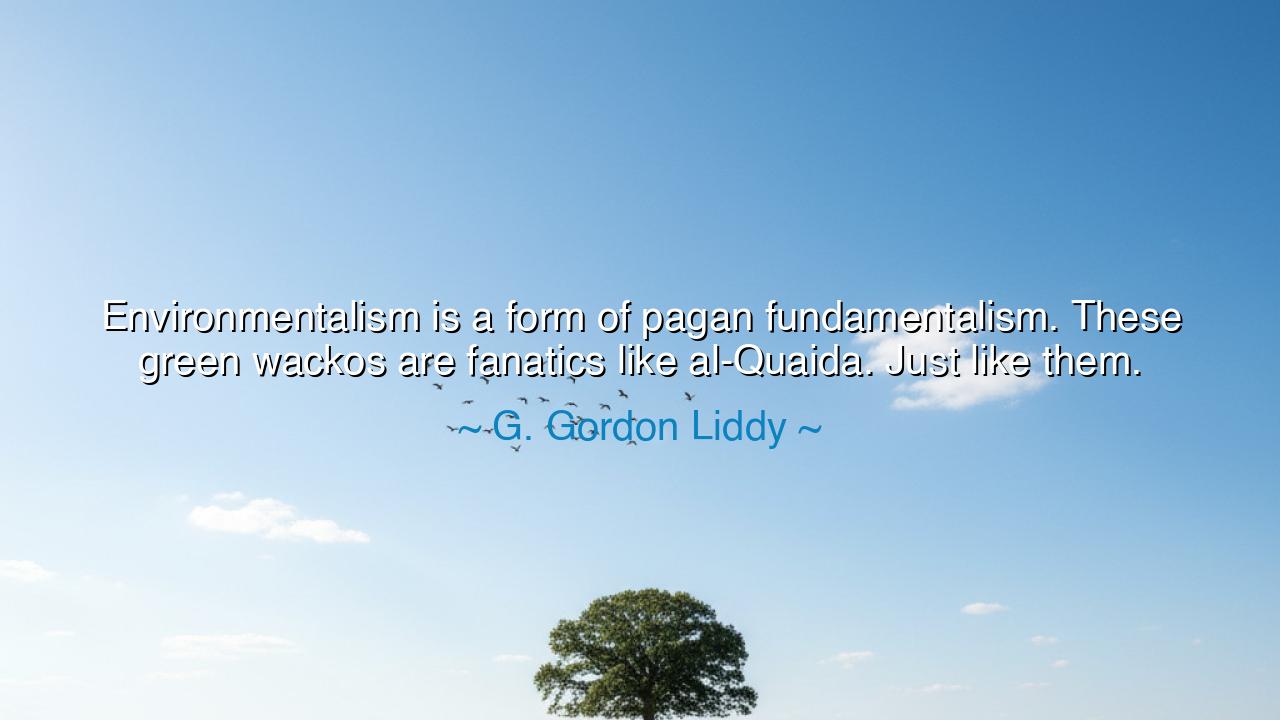
Environmentalism is a form of pagan fundamentalism. These green
Environmentalism is a form of pagan fundamentalism. These green wackos are fanatics like al-Quaida. Just like them.






In the fierce and provocative words of G. Gordon Liddy, the man known both for his defiance and for his unyielding conviction, we hear a cry that cuts to the heart of a great cultural struggle: “Environmentalism is a form of pagan fundamentalism. These green wackos are fanatics like al-Qaeda. Just like them.” To the unhearing ear, this may sound merely like anger; but to the listener who seeks wisdom, it reveals something deeper—a warning about extremism, about the peril that arises when belief, however noble its beginnings, becomes zeal without understanding. Liddy’s words are not gentle; they are forged in the language of combat. Yet behind their fire lies a question that echoes through the ages: When does devotion become dogma?
In every generation, causes are born—some righteous, others misguided—but all fueled by the passions of humankind. The ancients knew that fire both warms and destroys; it can illuminate the temple or burn it to ash. So it is with belief. Liddy’s comparison of certain forms of environmentalism to pagan fundamentalism is not an attack on the love of nature itself, but on what happens when reverence hardens into rage, when care for the earth transforms into contempt for humanity. He warns that even the most beautiful ideals can be twisted into fanaticism, when they cease to serve balance and begin to demand obedience.
History gives us many mirrors in which to see this truth. Consider the French Revolution, born from the purest desire for liberty and equality. Its champions sought to free men from tyranny, yet in their zeal, they built new guillotines in the name of virtue. What began as liberation became oppression, and the revolution devoured its own children. So too, Liddy reminds us, can any movement—be it political, religious, or environmental—fall prey to this same madness. When conviction becomes idolatry, when the cause eclipses compassion, it ceases to uplift and begins to destroy.
Yet let us not mistake his words for a call to apathy. Liddy was not urging indifference to the environment, but rather cautioning against blind devotion. The earth deserves care, and humanity bears responsibility for its well-being. But that care must be guided by wisdom, not fury; by reason, not fanaticism. True stewardship, as the ancients taught, is born of balance—reverence for nature coupled with respect for mankind. The danger he saw was not in those who plant trees, but in those who worship them to the exclusion of all else.
It is said that moderation is the crown of wisdom, and this truth shines through Liddy’s storm of words. The wise know that purity of intent must be tempered by self-awareness. To love the world rightly, one must also love its people. The farmer who tills the soil does not curse the rain nor the sun, but works in harmony with both. Likewise, humanity must learn to live with the world, not against it, nor in worship of it. The true guardian of the earth is not a zealot, but a caretaker, one who honors the balance of creation without falling into worship of the created.
We may see this spirit in the story of Theodore Roosevelt, who hunted and fought, yet also preserved vast forests and lands for future generations. He understood that the strength of a nation lies not in conquest of nature, nor in submission to it, but in harmony. He embodied what Liddy’s words implore us to seek—a balance between stewardship and strength, reverence and reason. For Roosevelt’s love of nature was not idolatrous; it was practical, noble, and deeply human.
So, O listener, take this as your lesson: guard your heart against the fires of extremism, even in noble causes. Love the earth, yes, but love truth more. Serve creation, but do not worship it. Seek harmony, not purity. When you stand for a cause, let your passion be tempered with humility, for zeal without wisdom becomes destruction. The true defender of the earth is not the one who shouts the loudest, but the one who acts with calm strength and lasting purpose.
And remember this: the danger Liddy spoke of is not confined to any one belief—it is a shadow that follows all human conviction. Whether in politics, religion, or the environment, fanaticism is the enemy of wisdom. The world needs neither worshippers of nature nor destroyers of it, but guardians—those who see that both man and earth are sacred, bound together in one eternal covenant. Seek that balance, and you shall walk not as a fanatic, but as a keeper of harmony, serving both the earth and the truth that sustains it.






AAdministratorAdministrator
Welcome, honored guests. Please leave a comment, we will respond soon